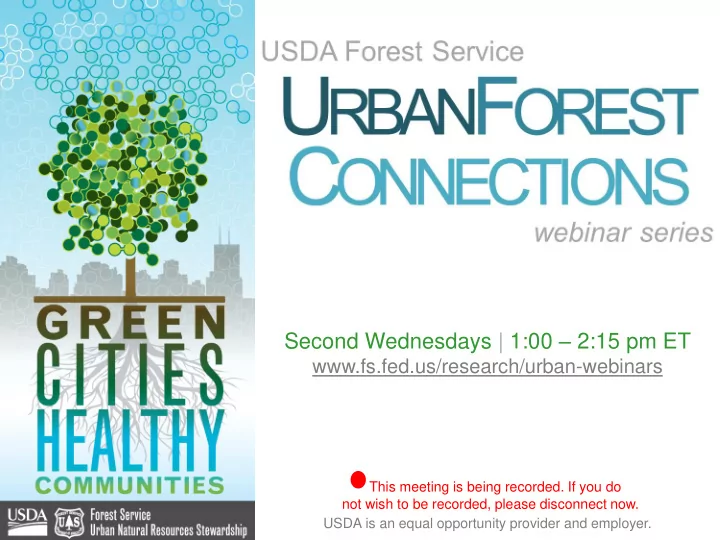

Second Wednesdays | 1:00 – 2:15 pm ET www.fs.fed.us/research/urban-webinars This meeting is being recorded. If you do not wish to be recorded, please disconnect now. USDA is an equal opportunity provider and employer.
Kevin Schronce Amber Knee Michelle Kondo Lead Planner Program Manager, Philadelphia Social Scientist LandCare Program City of Flint, Michigan USDA Forest Service Pennsylvania Horticultural Society
Michelle C. Kondo, Ph.D. Research Social Scientist USDA Forest Service Northern Research Station @usfs_nrs Philadelphia Field Station #phillyfieldstation michelleckondo@fs.fed.us @MichelleCKondo Vacant Land in the US
Vacant land in the US Declining populations Foreclosures Brownfields
http://www.legacycitydesign.org/
http://www.legacycitydesign.org/
http://www.legacycitydesign.org/
In the West: Foreclosures & Brownfields http://theatlantic.com
In the West: Foreclosures & Brownfields US EPA Brownfields & National Priority List (NPL) Sites http://superfund.ciesin.columbia.edu/sfmapper
Vacant Land Typologies Residential Commercial Industrial http://chicago.cbslocal.com Scott Olson/AFP/Getty Images Pennsylvania Horticultural Society https://nextcity.org Mike Linksvayer on Flickr http://www.zdnet.com http://www.businessinsider.com http://planphilly.com
Vacant Land Costs Lost household wealth Maintenance costs Remediation costs Uncollected property taxes Court / adjudication costs Public safety Public health
Michelle C. Kondo, Ph.D. Research Social Scientist USDA Forest Service Northern Research Station @usfs_nrs Philadelphia Field Station #phillyfieldstation michelleckondo@fs.fed.us @MichelleCKondo Research on Vacant Land and Public Health and Safety
Vacant Land and Health, Crime and Violence Cleaned, greened & maintained Vacant Trash dumping Reduced stress, fear Rodents Reduced crime and violence Pathogens Improved public health Illicit activity Fear, anxiety, stress, depression Photos: Pennsylvania Horticultural Society
Does vacant-lot clean & green impact stress levels (HR) of nearby residents? before Photos: Pennsylvania Horticultural Society after South, Kondo, Cheney, Branas (2015) Neighborhood blight, stress, and health: A walking trial of urban greening and ambulatory heart rate. American Journal of Public Health 105(4):909-913.
Does vacant-lot clean & green impact stress levels (HR) of nearby residents? 12 participants Compared average heart rates: pre-post greening within- vs. out-of-view preceding vs. succeeding greened lots Results: heart rate decreased when in view of vacant lots -15.6 bpm (Greened site) vs. -1.7 bpm (Control site) South, Kondo, Cheney, Branas (2015) Neighborhood blight, stress, and health: A walking trial of urban greening and ambulatory heart rate. American Journal of Public Health 105(4):909-913.
Vacant Lot Greening & Crime A n evaluation of the Landcare Program in Philadelphia 1999-2008 • C rime & health outcomes near 4,436 “cleaned -and- greened” lots compared to near 13,308 untreated vacant lots • Reductions in gun assaults city-wide, & in vandalism in W Phila • Less stress and more exercise in some parts of the city Branas, Cheney, MacDonald, Tam, Jackson, & Ten Have (2011). A difference-in-differences analysis of health, safety, and greening vacant urban space. American Journal of Epidemiology .
Doors and Windows Treatment & Crime An evaluation of effects of Doors & Windows treatment on crime in Philadelphia, PA (2011-2014) Results: significant reductions in assaults, gun assaults, nuisance crimes Kondo, Keene, Hohl, MacDonald, Branas (2015) The effects of a new vacant building remediation strategy on safety. PlosOne, 10(7).
Does community-engaged greening of vacant lots influence violence? Increased participation by neighborhood residents Improved community pride Removed locations for criminal activity Visible signs of care and ownership
Vacant Lot Greening & Crime A n evaluation of the Lots of Green (LOG) Program in Youngstown, OH 2010-14 • 244 greened lots randomly matched with 959 control vacant lots LOG 1.0: “clean & green” LOG 2.0: “community reuse” Kondo, Hohl, Han, Branas (2016) Effects of Greening and Community Reuse of Vacant Lots on Crime. Urban Studies . Youngstown Lots of Green Overview Report
Vacant Lot Greening & Crime A n evaluation of the Lots of Green (LOG) Program in Youngstown, OH 2010-14 • Reductions in burglaries and robberies (all lots & community reuse lots; reductions in assaults and violent felonies (community reuse lots) • Spill-over crime-reduction effects into neighboring areas, especially with community reuse lots LOG 1.0: “clean & green” LOG 2.0: “community reuse” Youngstown Lots of Green Overview Report Kondo, Hohl, Han, Branas (2016) Effects of Greening and Community Reuse of Vacant Lots on Crime. Urban Studies .
Vacant-lot greening with community engagement trial in Flint, Youngstown & Camden • Is community empowerment a vital component for establishing busy streets and preventing youth violence? • Experimental design to compare youth-engaged greening versus professionally implemented greening http://yvpc.sph.umich.edu/ The CDC National Centers of Excellence in Youth Violence Prevention: Building the Evidence for Community- Level and Policy-Level Prevention
Vacant Land and Health, Crime and Violence Cleaned, greened & maintained Vacant Trash dumping Reduced stress, fear Rodents Reduced crime and violence Pathogens Improved public health Illicit activity Fear, anxiety, stress, depression Photos: Pennsylvania Horticultural Society
Recommend
More recommend